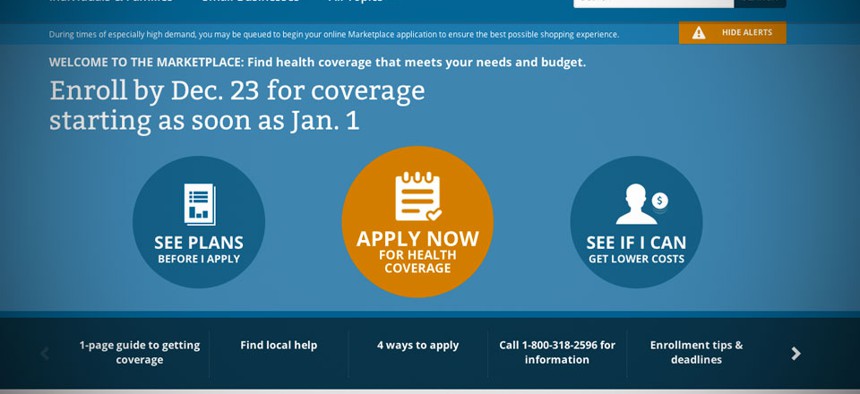Obamacare Reaches Critical Enrollment Deadline

HealthCare.Gov
For people who want coverage on Jan. 1, today is their last chance to get it.
Monday is a big day for Obamacare: It's the deadline to sign up for health insurance that begins Jan. 1.
There are still another three months to buy coverage, but a lot of people need it on Jan. 1. It's an important deadline for people with pre-existing conditions who had been priced out or overtly locked out of the individual insurance market and are now eager to get covered. And it's an important deadline for the millions of people whose insurance policies were canceled because of the Affordable Care Act.
Both groups were largely unable to shop for new plans in October and most of November, when HealthCare.gov was mired in technological problems. The White House has reported an enrollment surge in December, ahead of the deadline to sign up in time for Jan. 1 -- the earliest possible start date for plans sold through the law's insurance exchanges.
The law's critics have raised the possibility that because of plan cancellations and the broken website, more people will have lost coverage on Jan. 1 than gained it.
Whether that has happened is probably unknowable -- no one has a reliable estimate of how many plans were canceled. The White House says only about 500,000 people had their plans canceled and are now without coverage, while Republicans have put the total number of plan cancellations well into the millions.
The end of December also marks the halfway point in the six-month window to sign up for coverage through the exchanges. Given the website's disastrous launch, the administration will surely fall well short of its pre-launch expectations. The Health and Human Services Department had estimated that 3.3 million people would sign up for private insurance by the end of the year. It was 3 million people short of that mark at the end of November.
We won't know until January how many people signed up in December. It probably won't be 3 million, but administration officials say they've seen a surge with the website repaired and the Dec. 23 deadline looming. The first two days of December alone saw roughly 29,000 enrollments -- more than the entire month of October.
HHS has beefed up capacity over the past few weeks to handle the anticipated last-minute rush. Administration officials said they have added roughly 800 new representatives to Obamacare's call centers, bringing them up to about 12,000 trained agents. HealthCare.gov, the enrollment portal serving 36 states, has mostly been stable since Dec. 1, when the administration declared success in its push to have the site working "for the vast majority of users."
Administration officials said they might have to deploy the website's new queuing feature today, if the number of people trying to beat the deadline is more than the site can handle at one time. The system allows users to enter their e-mail addresses and notifies them when traffic subsidies.
In a briefing with reporters last week, administration officials said it was possible that users who tried to sign up today would be queued until tomorrow -- meaning they would technically miss the Dec. 23 deadline. They said they were working on a plan to ensure that those people would still be able to have their coverage begin on Jan. 1, since it wouldn't be their fault they missed the deadline.
The Dec. 23 cutoff leaves insurance companies with little time to process enrollments, and things will undoubtedly be messy as people try to use their new coverage.
Problems with HealthCare.gov's transmissions to insurance companies could result in people not having the coverage they thought they had purchased. And consumers technically aren't enrolled until they pay their first month's premium. At the administration's urging, insurers have agreed to give consumers until Jan. 10 to make that payment and still have their coverage begin, retroactively, on Jan. 1.
A senior administration official noted last week that confusion about insurance coverage existed before Obamacare -- people sometimes have to call and argue with their insurance company when they try to fill a certain prescription, for example. Still, the official said HHS will be monitoring those issues as coverage kicks in and will attempt to respond quickly to gaps caused by the enrollment process.
NEXT STORY: The 10 Biggest Scientific Breakthroughs of 2013





